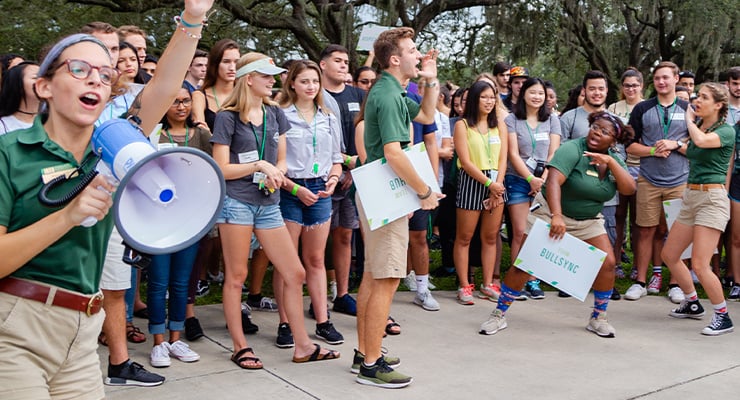Early Action vs. Early Decision: Everything You Need to Know
By Joni West | Last Updated: Mar 5, 2025

College admissions are more competitive than ever, and that has applicants scrambling for the slightest edge over their peers.
One of those potential advantages is applying by early deadlines, which now often fall up to ten months before each term begins. For example, USF’s Priority Application Deadline is early in November for the fall semester, and classes start in late August. To meet this deadline, the typical freshman will need to submit their application and all supporting documents by around the twelfth week of their senior year of high school. That’s early!
Every college handles early admissions differently, but their various processes are often described with the umbrella term early action. Some students and their families are confused about the difference between these early action approaches and a slightly different term, early decision.
…Gee, how come they’re so perplexed? Those sound totally different!
To clear things up for incoming freshmen and their families, we asked one of our terrific admissions counselors to help us get to the bottom of it all. Melissa Sharrock is the Assistant Director of Out-of-State Freshmen Recruitment here at USF, and in this article, she helped us get a better understanding of the differences between early action and early decision, the pros and cons of each, and what applicants should consider before making a commitment. This is everything you need to know about early action and early decision.
Why Apply Early at All?
“I feel like the timeline of the college application process has moved up since I went through the process,” Sharrock mused. “Students are engaging in the process earlier and schools have become more competitive, so they want to put their best foot forward by getting things done sooner rather than later.”
She’s found that students are eager to get started on their next steps, like housing, financial aid, and orientation. They want to complete them as early as possible so they’ll have the best options — and a more complete picture of what their college experience will be like.
Among many students and counselors, the Princeton Review noted, there is a belief that applying early substantially improves your chances of being accepted. “Applying early lets your favorite school (or schools) know that you are serious about attending,” they contended. “Schools track how many applicants accept their offers of admission and release those numbers to the public. A school looks good when a high percentage of accepted applicants chose to attend. So if they think you're likely to accept their offer of admission, it may give your application a leg up.”
Sharrock confirmed: “As decisions are being made and they're forming their class, most schools typically get much more competitive. For the most part, the earlier you apply to a school, the better your chances at admission.”
Better, but not guaranteed. Whether you’re applying early action, early decision, or something similar, work on backup applications, too, so one rejection doesn’t completely tank your college plans.
What is Early Action?
Early action is an admissions process where prospective students complete their applications by an earlier deadline and receive an admissions decision earlier than most applicants. These dates vary from school to school. The key difference between early action and early decision is that early action is not binding. If you apply early action, you are free to choose to enroll at a different school, no matter what.
Applicants who don’t apply early are said to be in regular decision, following the standard dates and deadlines a school has set for its incoming freshman class. Most students apply regular decision because it allows them more time to get their ducks in a row — GPA, test scores, extracurriculars, and any other factors that will affect a school’s decision to admit them.
It turns out that there isn’t much of a downside to early action. According to BigFuture, “Applying early action has three possibles outcomes: acceptance, denial, or deferred admission. The admissions office may defer your application if you’re not a candidate for early action. In that case, the admissions panel will reevaluate your application with the regular decision applicants.”
If you apply early action and your application is deferred, there is no requirement to reapply. When the school begins evaluating regular decision applicants, they’ll give you another look and issue a final admissions decision. The extra time may even allow you to update your application with improved test scores and additional accomplishments to increase your chances.
Sharrock says that early action is ideal for students who are already confident about the strength of their application or who find the benefits appealing. Those benefits may include:
- Early release of their admissions decision.
- For universities with multiple campuses, priority admission to your campus of choice.
- Priority admission to your term of choice (fall, spring, or summer).
- A head start on the housing process, increasing your on-campus housing options.
These benefits may be school-specific — you should research each school’s list of promises — but other benefits simply come from getting your college application process done early, like:
- More time to prepare for college life.
- More time to find scholarship opportunities.
- More time to focus on the present — your last year of high school! Extracurriculars, classwork, relationships, and milestone events like prom can safely be prioritized.
Sharrock pointed out that some schools, like USF, have processes that are similar to early action, but may go by a different name. “USF is interesting because we don't put an ‘early action’ label on our application deadlines,” she clarified. “Technically, we are still a rolling admissions university [sending decisions throughout the year as applications are received], but we have a priority deadline that gives some of the benefits early action would. If a student asked me if we had early action, though, I would say no.”
Another common variation is single choice or restrictive early action. Under this model, used by a few highly selective schools, you are contractually obligated to refrain from submitting any additional early action or early decision applications at other schools, but your regular decision options remain open; you are not required to accept an offer of admission.
What is Early Decision?
Like early action, early decision requires you to meet certain fall deadlines and grants you an admissions decision much sooner than most of your peers. It also has the same benefits. The key difference lies in the level of commitment. One of our previous Admit-a-Bull articles defined it perfectly. Under early decision, “you will be contractually obligated to attend the school if accepted…If you receive an acceptance letter, you must withdraw any applications to other schools.”
Early decision applicants are usually required to sign a legal agreement accepting the terms. Signatures may also be required from the student’s parent/guardian and college counselor. If they break the agreement, penalties apply, determined by each school.
Although early decision may appeal to top-performing students with a single-minded interest in one specific school, Sharrock recommends caution and urges every student to go over the terms and penalties with a college representative before signing anything.
A legal contract is a serious commitment. “If I were advising a student, I would ask, ‘Are you truly ready to make that level of commitment or not?’” Sharrock said. “If that is really your dream school, if you've done all your research, you're prepared to go to that school, and you want your best chance of getting in, maybe early decision works for you.”
If not, though, Sharrock recommends reflection. “If you've got hesitation, try to shore up your decision. Evaluate what that school is looking for in their applicants and determine whether a different timeline like regular decision is better for you.”
The National Association for College Admission Counseling (NACAC) echoed Sharrock’s warning. “Gambling on the chance of an earlier decision comes with a cost. Students applying early, especially under a binding agreement, are essentially condensing their application process and foregoing additional time to research other options…The last thing you want to do is make a potentially binding decision without enough consideration.”
When you hear about the stringent expectations around early decision, you might imagine that it’s only offered by the most famous, world-class universities, like those in the Ivy League, but Sharrock says that’s not the case. “There are a lot of public state institutions that do early decision,” she observed. “It is a smaller number of schools, because it's asking students to make quite the commitment, but I haven’t noticed any patterns. I think schools make that decision based on their enrollment goals and how they need to get there.”
Is Early Decision Fair?
There is some controversy surrounding early decision and its restrictive, binding agreements. CollegeBoard pointed out that early decision plans have “come under fire as unfair to students from families with low incomes, since they do not have the opportunity to compare financial aid offers. This may give an unfair advantage to applicants from families who have more financial resources.”
While applicants who apply early may receive admissions decisions much sooner, they may still need to wait on financial aid offers from each school on their list, even if they filled out the FAFSA early. When families are deciding which college their student should commit to, we usually recommend that they compare the various financial aid packages offered to them.
Early decision removes that option entirely. You cannot accept any other offers, even if the financial aid would be better — though according to U.S. News & World Report, exceptions exist. Some schools will release you from your early decision contract if they can’t provide the financial aid you need. Before you sign any agreement, make sure you ask a college representative whether there are any situations like this that will void the contract.
“I think a student needs to be very confident in making that decision and already have an idea of their financial situation,” Sharrock said. “No student is the same. Everybody comes into this world with their unique, lived experiences. When a student is applying to college, they bring all of that with them. They need to be as informed as possible when making this big choice.”
Key Questions to Consider when Making an Early Decision Commitment
Being as informed as possible is easier said than done, but worth the effort. Before you apply early decision, get organized. List each school you’re considering, and note for each one:
- Their admissions requirements
- Their acceptance rate
- Fees associated with the admissions process
- Whether they offer other early application programs
- Dates and deadlines
- Your ability to meet those deadlines
Preparing to submit your academic achievements for scrutiny is just the start, though.
“When a student is considering early decision, it's extremely important that they don't just think about getting into their top school,” Sharrock said. She pointed out that there’s more to college admissions than being accepted. “They need to think about their enrollment at that school, too.”
Sharrock offered a list of questions for students considering early decision. These questions will help students determine whether a school is a top choice worth the commitment:
- Am I prepared for the academic expectations at this school?
- What is my life going to look like at this college or university?
- What are my goals as a student?
- Do I want to live on campus? Is that required for freshmen?
- Do I want a big school or small school?
- Is it close to home or far away, and which do I prefer?
- Can I visit the school in person, and if not, do they offer virtual visits?
- What resources does the school offer its students?
- Does the school have good internship and career opportunities?
- What percentage of students graduate from this school?
- Is the cost of attendance reasonable after financial aid and before?
- How much is it going to cost me to get what I need out of this school, including considerations like extracurriculars, study abroad opportunities, and spending money?
- How will these costs affect my life?
This list is not exhaustive. Students should add their own criteria, then give each item thorough deliberation, using resources like college counselors, admissions counselors, financial aid advisors, and the college’s website.
Ultimately, it’s up to the student and their family to make the decision that feels right. “So many of our responses to students and families asking us questions about the admissions process include ‘it depends,’ and I hate that answer,” Sharrock explained. “I wish I could give a concrete answer for things, but in most cases, it depends on the student, their situation, and what they’re prepared for.”
Trust an Admissions Counselor with Your Questions
When it comes to early action and early admissions, a student’s top priority should be knowing what each process can give them, weighing their options, and asking as many questions as they can.
For admission to USF, Sharrock always encourages students to apply early. “It's not binding at all. It’s going to do nothing but benefit them.”
Her parting advice for students considering early decision rings true for college admissions as a whole. “Use all your resources. Talk to admissions counselors. Talk to your high school counselor, too. A lot of them have engaged with college professionals and know these terms like early action and early decision, priority and rolling admissions. You don't have to do it all alone.”
Sharrock reminded students that admissions counselors are here to help, even though the college is their employer. Universities want good students to enroll, and they want them to stay. They are invested in your success because it builds up their reputation, too.
Many students hesitate to talk to personnel at a school they’re applying to because they’re worried perceptions of doubt will negatively affect their application, but Sharrock insisted that’s not how it works. Admissions counselors are enthusiastic about helping.
“If a student calls and says, ‘Hey, Melissa. I read your website, and I don't really know what this language about priority admissions means. Can you clarify?’ I would love to. Let's have that conversation. Let's make sure that you're clear on what this means.”
If you have questions about applying early or any other admissions topic, our counselors are eager to speak to you! Contact our Admissions team by phone at (813) 974-3350 or email admissions@usf.edu for help.


